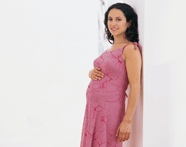The Progress of Pregnancy

Having a baby growing inside you is like being part of a real-life miracle. Sometimes you’ll pat your stomach and feel you can hardly believe your child is in there. Take time to ponder the wonder of what’s happening; you’ll both be laying the foundations for a baby who feels secure and wanted.
Following your pregnancy
No part of a woman’s body escapes when she’s carrying a baby, and you both need to keep that in mind. For instance, tender breasts that are getting ready for breastfeeding need to be treated gently by a father when he caresses them; the growing uterus pressing onyour internal organs means that you must never be too far from a toilet during the last three months of pregnancy. The guide that follows is only a brief outline of the complex changes going on inside your body.
What’s happened by three months
The first three months of pregnancy (the first trimester) are tremendously important in laying the foundations of your baby’s healthy development, although there are few visible signs of your baby’s phenomenal growth. You at three months
Your pregnancy is well established now:
- You’ll really start to gain weight regularly; any morning sickness will soon disappear.
- The uterus is rising out of the pelvis and can be felt.
- The risk of miscarriage is almost zero by this time.
- Your heart is working hard and will continue to throughout the rest of your pregnancy.
Your baby at three months
She is fully formed, but needs to mature:
- She has a fully formed body, complete with fingers, toes, and ears.
- Her eyes move, though her eyelids are closed.
- Her body is covered with fine hair.
- She wriggles if poked – her muscles are growing.
What’s happened by six months
The period from about the third to the sixth month (the second trimester) is when morning sickness ends, your baby really grows, and you begin to feel her move. You’re brimming with energy, vitality, and well-being.
You at six months
You’ll notice the following signs:
- You’re putting onabout 1 lb (0.5 kg) of weight per week.
- Your uterus is a good 2 in(5 cm) above the pelvis.
- You may have bouts of indigestion.
- From about 20 weeks, you’ll feel your baby move.
Your baby at six months
She’s well developed and growing:
- Her hearing is acute, she canrecognize your voice.
- She’s becoming better proportioned – her body is catching up with her head.
- She’s well muscled but thin. She’ll put onfat now.
- Her lungs are growing and maturing fast.
What’s happened by nine months (full term)
The final 12 weeks or so of pregnancy, knownas the third trimester, are whenthe baby puts on fat in preparation for birth, and the brain and lungs mature in preparation for independent life. You in the last weeks of your pregnancy
You may have to visit your doctor/midwife more often, and you may notice the following signs:
- You may feel a “lightening” as your baby’s head drops into the pelvis.
- It’s more difficult to find a comfortable positionfor sleep.
- Your breasts secrete clear-coloured, nutritious colostrum.
Your baby in the last weeks of your pregnancy
He’s preparing to be born:
- He weighs about 6-8 lb (2.7-3.5 kg) and he measures 14-15 in (35-38 cm) from crown to rump.
- His head is “engaged,” lying just on top of your cervix.
- The placenta is 8-10 in (20-25 cm) across, 1 in (3 cm) thick, and there is 1 quart (1 liter) of amniotic fluid.
- His breasts may be swollen due to the action of your hormones.
FOR MOTHERS
Coping with common complaints
- Feeling sick is most common in the first three months. It may happen in the morning, but by no means always, and you may also vomit. Eating frequent small meals rather than big meals helps. If you’re vomiting incessantly, consult your doctor.
- You’re more likely to get cramps in your legs or feet. It’s not known exactly why, but you can relieve it by pulling your toes up hard toward your ankle.
- Constipation is a common problem, caused by the presence of hormones that slow down the workings of the large intestine. Eat plenty of fibre, exercise regularly, and drink plenty of water. Iron pills may make it worse.
- Later in pregnancy, you may suffer from indigestion or heartburn, because your enlarging womb is pressing on your stomach. Prevent this by eating smaller meals more often, sitting up straight when eating, and avoiding spicy foods. Sipping milk, especially at night, can help if you have heartburn.
- Hemorrhoids – swollen varicose veins that protrude from the anus – occur in pregnancy due to pressure from the baby, especially if you’re constipated. Eat plenty of fibre and avoid standing for long periods. Check with your doctor if they become very painful.
FOR FATHERS
Although you’re experiencing the pregnancy secondhand, following its progress helps you to become emotionally attached to your unborn baby.
The progress of pregnancy
- Accompanying your partner to prenatal appointments enables you to find out together how your baby is growing.
- Remember that the baby is part of you as well as your partner. It’s amazing to think that a single cell created from your sperm and your partner’s ovum can develop so rapidly.
- Understanding and learning about the impact of the growing baby and uterus on your partner’s body helps you to be sympathetic when she suffers the inevitable discomforts caused by the pregnancy.




